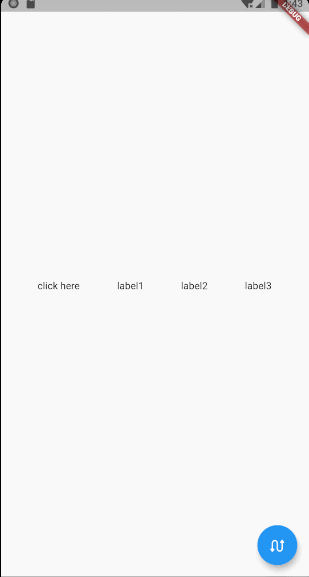lua_dardo 0.0.5  lua_dardo: ^0.0.5 copied to clipboard
lua_dardo: ^0.0.5 copied to clipboard
A Lua virtual machine written in Dart, which implements Lua5.3 version.
LuaDardo #

A Lua virtual machine written in Dart, which implements Lua5.3 version.
Example: #
dependencies:
lua_dardo: ^0.0.3
import 'package:lua_dardo/lua.dart';
void main(List<String> arguments) {
LuaState state = LuaState.newState();
state.openLibs();
state.loadString(r'''
a=10
while( a < 20 ) do
print("a value is", a)
a = a+1
end
''');
state.call(0, 0);
}
Usage #
The LuaDardo library is compatible with most Lua C APIs. For the mutual call between Dart and Lua, please refer to the Lua C API guide.
Some simple examples:
LuaState state = LuaState.newState();
// Load the Lua standard library
state.openLibs();
state.loadString("print('hello')");
state.call(0, 0);
Dart calls Lua #
Get Lua variables:
-- test.lua
a = 100
b = 120
Dart code:
LuaState ls = LuaState.newState();
ls.openLibs();
ls.doFile("test.lua");
// a push into the stack
ls.getGlobal("a");
if(ls.isNumber(-1)){
var a = ls.toNumber(-1);
print("a=$a");
}
// b push into the stack
ls.getGlobal("b");
if(ls.isNumber(-1)){
var b = ls.toNumber(-1);
print("b=$b");
}
Get lua global table:
-- test.lua
mytable = {k1 = 1, k2 = 2.34, k3 = "test"}
Dart:
ls.getGlobal("mytable");
ls.pushString("k1");
// Pop the key at the top of the stack, get the value of the key, and push the result onto the top of the stack
ls.getTable(-2);
if(ls.isInteger(-1)){
// Get the value of key k1
var k1 = ls.toInteger(-1);
}
// Repeat
ls.pushString("k2");
ls.getTable(-2);
if(ls.isNumber(-1)){
var k2 = ls.toNumber(-1);
}
A simpler alternative: getField
ls.getGlobal("mytable");
ls.getField(-1, "k1");
if(ls.isInteger(-1)){
var k1 = ls.toInteger(-1);
}
Call lua function:
-- test.lua
function myFunc()
print("myFunc run")
end
Dart:
ls.doFile("test.lua");
ls.getGlobal("myFunc");
if(ls.isFunction(-1)){
ls.pCall(0, 0, 0);
}
The pCall method has three parameters. The first parameter indicates the number of parameters of the called Lua function, and the second parameter indicates the number of return values of the called Lua function.
Lua calls Dart #
// Push value onto stack
ls.pushString("Alex");
// Set variable name
ls.setGlobal("name");
Lua:
-- Get global variable name
print(name) -- Alex
Define global table in Dart:
// Create a table and push it onto the stack
ls.newTable();
// Push a key onto the stack
ls.pushString("name");
// Push the value onto the stack. Note that at this time the index of the table in the stack becomes -3
ls.pushString("Alex");
// Set the above key-value pair to the table, and pop up the key and value
ls.setTable(-3);
// Set the variable name to the table, and pop up the table
ls.setGlobal("students");
Lua:
-- Equivalent to a table:students = {name="Alex"}
print(students.name)
Call Dart function:
import 'package:lua_dardo/lua.dart';
import 'dart:math';
// wrapper function must use this signature:int Function(LuaState ls)
// the return is the number of returned values
int randomInt(LuaState ls) {
int max = ls.checkInteger(1);
ls.pop(1);
var random = Random();
var randVal = random.nextInt(max);
ls.pushInteger(randVal);
return 1;
}
void main(List<String> arguments) {
LuaState state = LuaState.newState();
state.openLibs();
state.pushDartFunction(randomInt);
state.setGlobal('randomInt');
// execute the Lua script to test the randomInt function
state.loadString('''
rand_val = randomInt(10)
print('random value is '..rand_val)
''');
state.call(0, 0);
}
Some people are curious about how to access Lua tables in Dart. Here is a simple example:
state.loadString('''
rand_val = randomInt(10,{ ["hello"] = "World", ["hello22"] = "World132414" })
print('random value is '..rand_val)
''');
int randomInt(LuaState ls) {
int? max = ls.checkInteger(1);
ls.getField(2, "hello");
// This is a debugging method that looks at the stack
ls.printStack();
var hello = ls.toStr(-1);
print(hello);
ls.pop(1);
ls.getField(2, "hello22");
var hello22 = ls.toStr(-1);
print(hello22);
ls.pop(1);
var random = Random();
var randVal = random.nextInt(max!);
ls.pushInteger(randVal);
return 1;
}
Try on Flutter #

function getContent1()
return Row:new({
children={
GestureDetector:new({
onTap=function()
flutter.debugPrint("--------------onTap--------------")
end,
child=Text:new("click here")}),
Text:new("label1"),
Text:new("label2"),
Text:new("label3"),
},
mainAxisAlign=MainAxisAlign.spaceEvenly,
})
end
function getContent2()
return Column:new({
children={
Row:new({
children={Text:new("Hello"),Text:new("Flutter")},
mainAxisAlign=MainAxisAlign.spaceAround
}),
Image:network('https://gitee.com/arcticfox1919/ImageHosting/raw/master/img/flutter_lua_test.png'
,{fit=BoxFit.cover})
},
mainAxisSize=MainAxisSize.min,
crossAxisAlign=CrossAxisAlign.center
})
end
For use in flutter, see here.
一些中文资料: